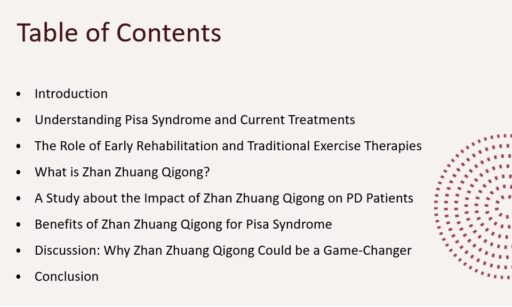Pisa syndrome (PS), a debilitating postural abnormality, often affects individuals with neurological disorders like Parkinson’s disease (PD). Effective treatments for PS remain elusive. Recent studies have explored the benefits of Qigong for PD symptoms, but its potential for addressing PS is yet to be determined.
A new clinical trial in China aims to fill this gap by investigating the effects of Zhan Zhuang Qigong, a standing meditation practice, on PS in PD patients.

A tutorial with details is available for ATCQA Members and Certified Instructors/Practitioners. Other people can purchase the tutorial for a small fee in our online store.
About the Study
Researchers will recruit 60 participants with PD who exhibit PS. They will be divided into two groups:
- Conventional Treatment Group (30 people): Standard medications and physical therapy.
- Qigong Group (30 people): Standard care plus 30 minutes of Zhan Zhuang Qigong, practiced five times per week.
The trial will measure immediate outcomes and long-term effects after six months and one year.
To assess progress, participants will undergo evaluations using:
- NeuroPostureApp and B-PHY System: For monitoring posture and balance metrics, such as Pisa angles and plantar pressure distribution.
- Unified Parkinson’s Disease Rating Scale: To track motor function.
- Parkinson’s Disease Quality of Life Questionnaire: For assessing overall well-being.
Why Zhan Zhuang Qigong?
Zhan Zhuang Qigong emphasizes maintaining a stable, upright posture and fostering internal balance. These principles may directly counteract the misaligned posture characteristic of PS, while improving muscle strength, proprioception, and relaxation—factors often impaired in PD.
The Road Ahead
If successful, this study could establish Zhan Zhuang Qigong as a non-invasive, low-cost treatment for PS, enhancing both motor function and quality of life in PD patients. With its rigorous design and holistic approach, the trial holds promise for uncovering new ways to manage a complex condition.